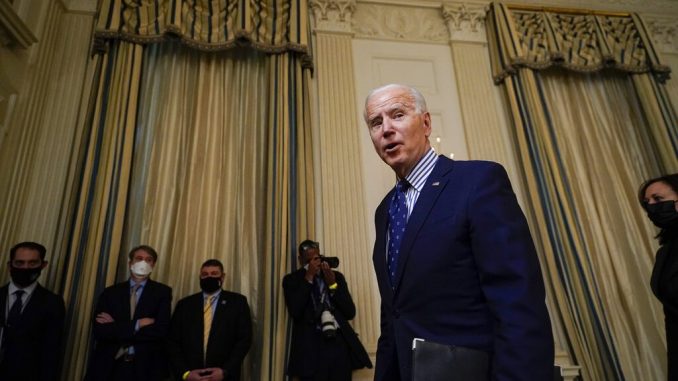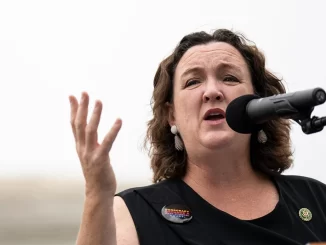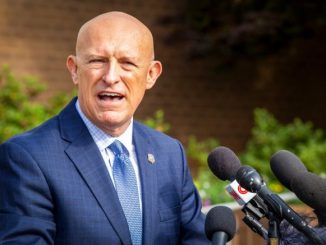

Kamala Harris and Joe Biden left after Biden spoke in the State Dining Room of the White House, Saturday, March 6, 2021, in Washington. (AP Photo/Alex Brandon)
OAN Newsroom
UPDATED 2:00 PM PT – Sunday, March 7, 2021
Progressive Democrats continue to pressure their moderate counterparts to scrap the filibuster as a way of pushing their agenda through Congress.
Recent reports show more Democrats are joining in the effort to pressure the White House to kill the filibuster, saying its the only way they’ll get their bills passed.
The filibuster sets the bar at at least 60 votes in the Senate to pass most legislation, meaning the 50 non-Republicans in the upper chamber have to get the support of at least 10 of their GOP colleagues in order to pass a proposal.
Moderate Democrats like Sen. Joe Manchin (D-W.Va.) and Sen. Kyrsten Sinema (D-Ariz.) however, have thrown their support behind the procedure, citing they’d like to see bipartisanship in the Senate.
In an interview on Sunday, Manchin said it “takes listening to the minority to make sure the majority is getting it right.”

Sen. Joe Manchin spoke during a Senate Committee on Energy and Natural Resources hearing on the nomination of Rep. Debra Haaland, D-N.M., to be Secretary of the Interior on Capitol Hill in Washington, Wednesday, Feb. 24, 2021. (Leigh Vogel/Pool via AP)
“This is tribal. Republicans will never agree on anything, or Democrats will never agree. I don’t subscribe to that, I don’t buy into that,” Manchin stated. “There’s no need for us to go to reconciliation until the other process has failed. That means the normal process of a committee, a hearing, amendments.”
Under reconciliation, a simple majority is needed to pass a bill. However, this can only be used on bills that are focused on spending, revenue and the federal debt limit. It is limited to only three bills per year.
Even the White House said it is not for ending the filibuster, with Joe Biden confirming he’s still opposed to dropping the procedure.
“His preference is not to end the filibuster. He wants to work with Republicans, to work with independents,” White House communications director Kate Bedingfield said. “He believes that, you know, we are stronger when we build a broad coalition of support.”
However, when it comes to things like election reform, even moderate Democrats have shown they’re willing to be more flexible on the 60 vote threshold.
Top Democrats have voiced they’re not going to allow the filibuster to shut down the recent voting reform bill passed in the House. They suggested there should be reconciliation permission for proposals involving civil and voting rights.
Even Manchin has signaled his willingness to ditch the filibuster when it comes to the election proposal.
The current election reform bill passed along party lines in the House and is unlikely to get much bipartisan support in the Senate. Under current rules, it is not clear how much of the bill would survive under the reconciliation process.






Be the first to comment